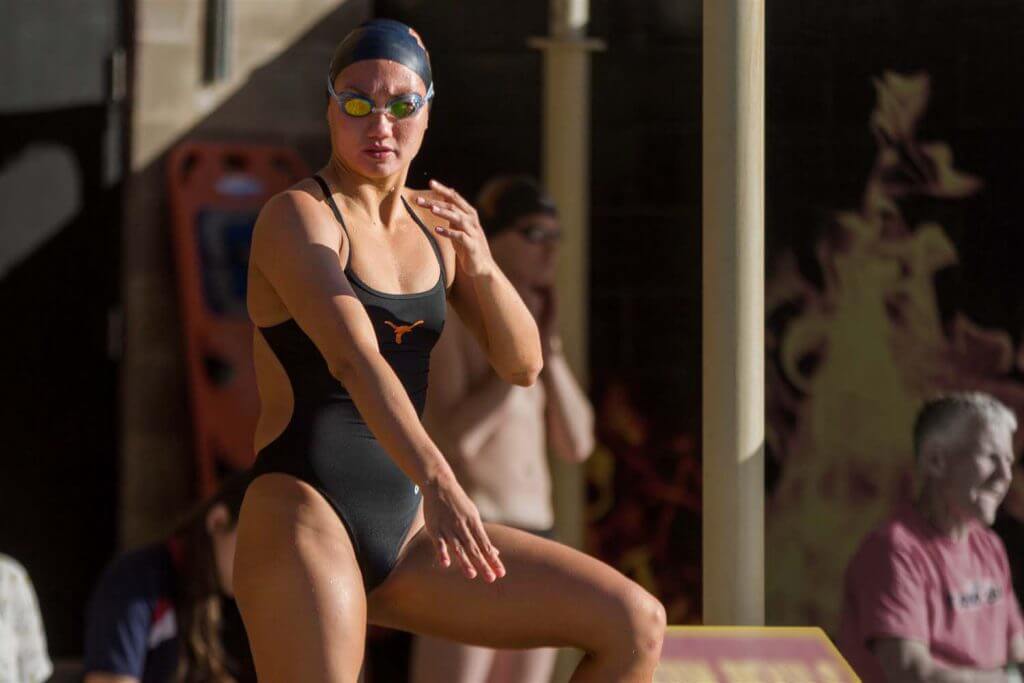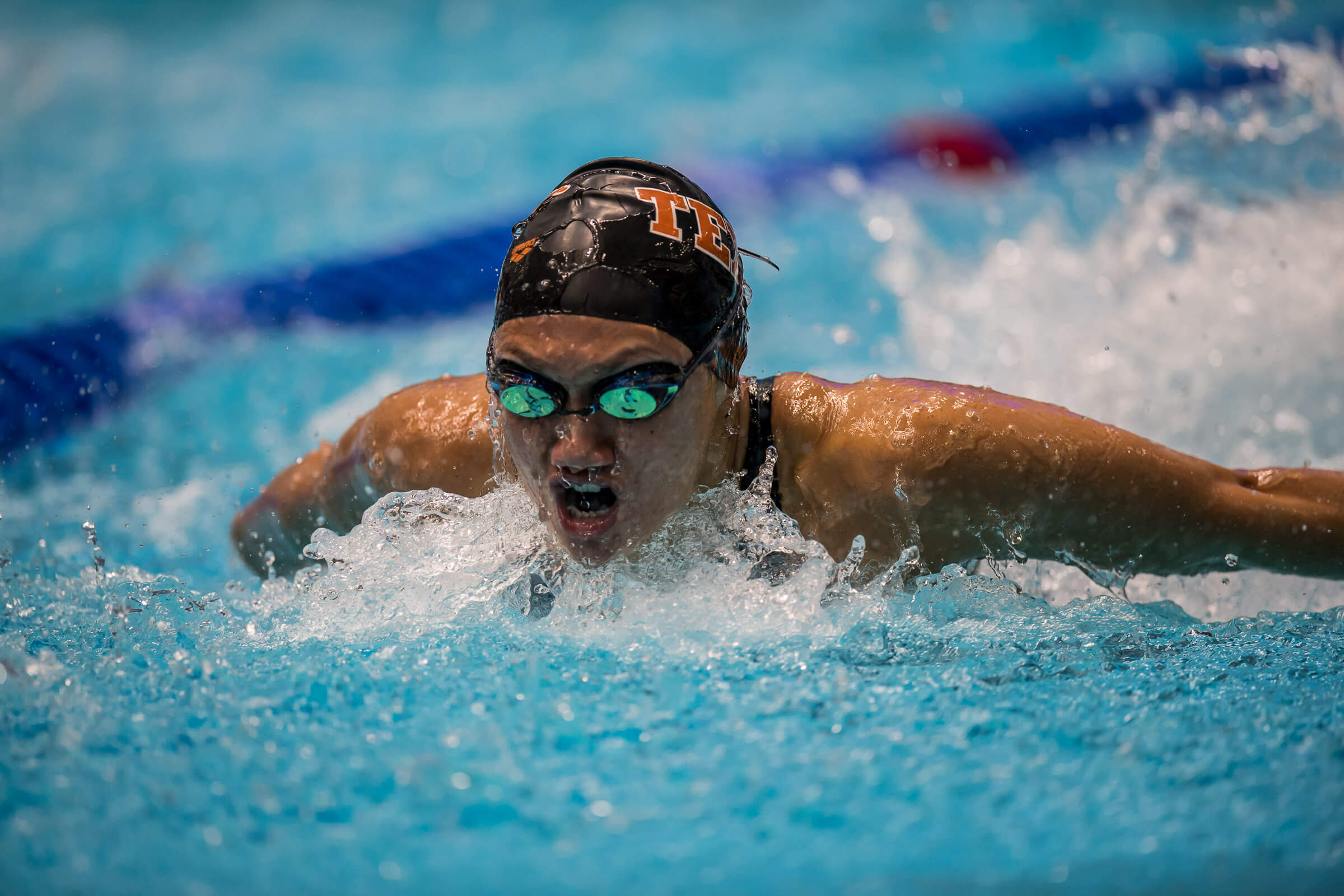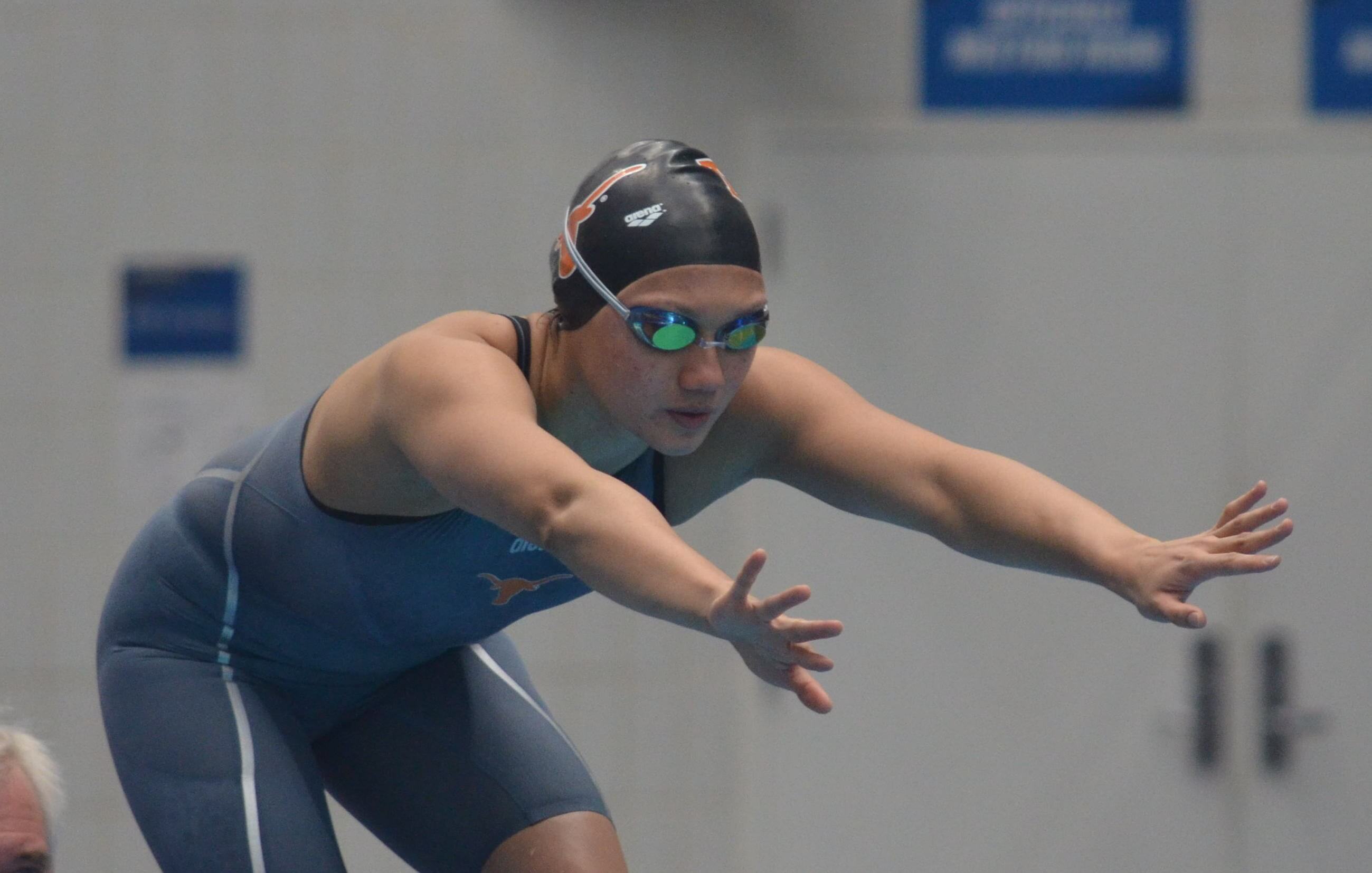Disqualification in the Pool Did Not Affect Remedy Rule

By David Rieder.
Imagine you just swam the race of your life—a best time by a full second, by far your best-ever finish at a national level meet. And then imagine that in a split-second, it was gone—your time erased from record, replaced by the letters “DQ.”
Finally, imagine having the strength and courage to get out of the pool, walk away and smile.
That’s what Remedy Rule did last March after the 200 fly final at the NCAA championships. Why get down, she figured, after how far she had come?
One year earlier, she had been at her first NCAA championships as a Texas Longhorn. She had arrived in Austin as one of the top recruits in the country from Crozet, Va., but the results in year one were not what anyone had hoped for or expected. At an NCAA champs where seemingly everything was off for the Texas women, Rule’s highest finish was 46th—second-to-last—in her signature 200 fly.
“I don’t know if you saw my results from my freshman year, but they were not great,” Rule said.
With almost two years having passed, the 21-year-old could joke about it, about her 2:00.45 effort that was slower than she had consistently swum in dual meets throughout the season. But back then, it was a wake-up call to make changes. So in year two, she did.
“I feel like it was a lot of little things I changed, and those little things helped me make a big change in the pool. Just finding my place at Texas and coming into my own really helped me last year,” Rule said.
“It was a lot of open communication, not being afraid to ask for help and just doing things—like, I always wanted to lead the lane freshman year, but I was too afraid to because I was a freshman. But then I was like, ‘You know, this is what I want to do,’ so I did it. Just being more open with my emotions and feelings to my teammates and other people and not bottling everything in.”
When she returned to the NCAA championships in Indianapolis, Rule had grown up, become more comfortable in her place at Texas and, oh yeah, gotten a lot faster. In the 100 fly, she missed a place in the top-16 by just 0.14, but one day later, she qualified for the A-final in the 200 fly.

Photo Courtesy: Peter H. Bick
Out in lane one, Rule went for it. She stayed close to pre-race favorites Ella Eastin and Katie McLaughlin through the first 150 yards. Even as she fell off the pace on the last 50, Rule had done enough to touch the wall third in 1:52.92—her best time by more than a second.
Then came the DQ. Officials said that Rule’s head broke the surface past 15 meters on her start. Video evidence of whether she did or did not stay underwater too long is inconclusive, but the decision was final, with nothing Rule or anyone with the Texas team could do about it.
After the DQ, Texas no longer controlled its own destiny in its team battle. The Longhorns stood in fourth place after the 200 fly, the final individual swimming event of the meet, but their 4×100 free relay team had finished ninth in the prelims, meaning Georgia could overtake Texas for fourth by finishing first or second in the last relay, regardless of how Texas placed in the B-final.
Indeed, Texas won the B-final and Georgia took second in the A-final, finishing with 252.5 points to the Longhorns’ 252.
Still, after the performance of a lifetime, Rule could not get down on herself. Just minutes after her race, during a break for platform diving, Rule was smiling.
“I was able to perform at finals at NCAAs in the 200 fly,” she said. “Even though I got DQed, the DQ didn’t take away from the fact that I was able to perform at that kind of level, and just knowing that I was able to grow that much. Really, the DQ just hurt my ego. It took away the glory of standing on the podium, but it didn’t take away all the hard work that I’d done.”
That evening, Rule proved to herself what she was capable of, and even if she did kick a couple inches too far off the start, that’s not the difference in dropping a second off her best time or even the two tenths by which she beat the next finisher in the race, Virginia’s Jen Marrkand.

Photo Courtesy: Dan D’Addona
Still, it’s no surprise that she came away from NCAAs with a hunger to prove herself again.
“After NCAAs, that was the most motivated I think I’ve ever been after a championship meet to get back in the pool, kill training and race that well again,” she said.
At U.S. Nationals over the summer, Rule qualified for the final of the 200 fly and finished eighth, dropping a second from her previous lifetime best and improving on her Olympic Trials finish by 45 spots. (No, that’s not a typo.)
Now in her junior year at Texas—“it’s strange being an upperclassman,” she admitted—Rule will head to her third NCAA championships this March having dealt with just about everything that meet could throw at her.
That evening in Indianapolis, the DQ could not shake her confidence, and when she heads to Columbus, Ohio, next month, she knows all she needs to know: In finals at NCAAs, she can perform.




.png)
A great article about perspective in swimming and life!!
That is the Remedy we know…such a great competitor and role model! Hook ‘Em?